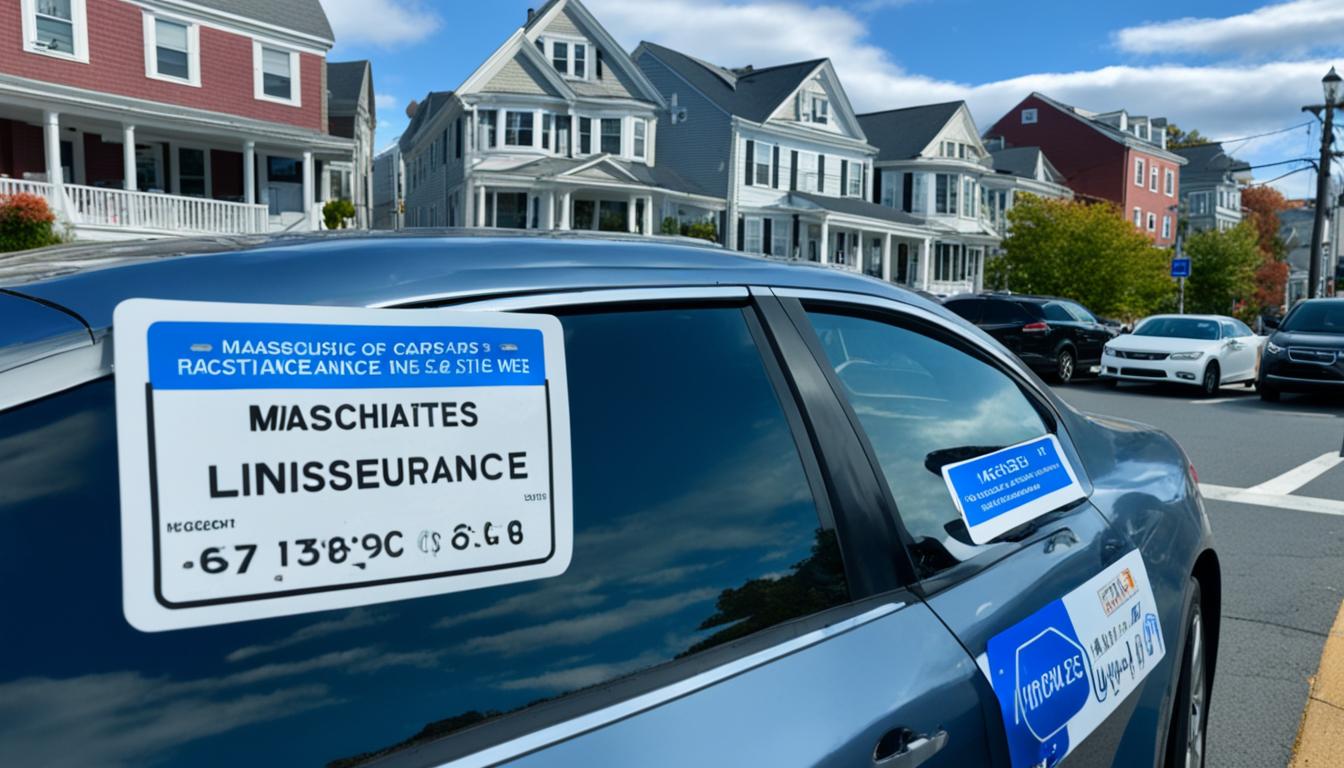When it comes to moving to a new state, there are many things to consider, including changing your car insurance to comply with the laws and regulations of your new location. If you find yourself relocating to Massachusetts, it’s essential to understand the process of switching your auto insurance policy. This step-by-step guide will walk you through the necessary steps for changing car insurance in Massachusetts seamlessly.
Key Takeaways:
- 1. Contact your insurance agent to assess coverage options in your new state.
- 2. Verify the requirements of the Massachusetts Department of Motor Vehicles for registration and auto insurance.
- 3. Obtain quotes from multiple insurance companies to find the best policy for your needs and budget.
- 4. Register your vehicle at the local DMV with the necessary documents.
- 5. Obtain a new driver’s license when applying for vehicle registration.
Start by Contacting Your Insurance Agent
When it comes to changing your car insurance in Massachusetts, the first step is reaching out to your insurance agent. Contact your current insurance company and inquire if they offer insurance coverage in your new state. It’s important to check if there will be any changes in coverage costs or if there are any specific requirements for your new location. This initial contact is crucial to gather information and assess your options.
If your current insurance company doesn’t serve your new state, don’t worry. You can ask your agent for a referral to an insurance agent who does. They can connect you with a trusted professional who will guide you through the process of switching your car insurance to your new state seamlessly.
Check the Requirements of Your New State
When you move to a new state, it’s crucial to familiarize yourself with the registration and auto insurance requirements set by the Department of Motor Vehicles (DMV) in your new location. By understanding these requirements, you can ensure that you have the necessary documents and coverage to legally operate your vehicle and avoid potential fines.
Start by visiting the website of the DMV in your new state to gather information on the specific registration and auto insurance requirements. The DMV website will provide details on the documents you need to submit, the deadlines for registration, and the minimum coverage required.
It’s important to note that when transitioning from one state to another, there is typically a transition period during which you need to update your documents and comply with the new state’s laws. Make sure you have enough time within this transition period to obtain the necessary documents and fulfill the requirements.
If you fail to comply with the registration and auto insurance requirements within the designated timeframe, you may be subject to fines and penalties. These fines can vary depending on the state and the severity of the violation. Therefore, it’s essential to stay informed and complete the necessary steps in a timely manner.
If you are moving from a fault state to a no-fault state, you may encounter additional auto insurance requirements. In fault states, the insurance coverage of the at-fault party typically pays for damages in an accident. In contrast, no-fault states require drivers to carry personal injury protection (PIP) coverage, which covers medical expenses regardless of who is at fault in the accident. Be sure to review the specific requirements of your new state to ensure you have the appropriate coverage.
Additionally, keep in mind that the minimum coverage requirements may differ from those in your previous state. It’s important to review these requirements and make any necessary adjustments to your auto insurance policy to meet the new state’s standards.
By checking the requirements of your new state and understanding how they differ from your previous location, you can ensure that you are fully compliant with the law and have the necessary coverage to protect yourself and others on the road.

Obtain Quotes and Purchase a New Insurance Policy
When it comes to changing your car insurance policy in Massachusetts, it’s essential to gather quotes from multiple insurance companies. By doing so, you can compare pricing, coverage options, and find the best policy that meets your specific needs and budget.
Start by reaching out to various insurance providers and requesting quotes. Provide them with the necessary information, such as your vehicle details, driving history, and coverage needs. Keep in mind that each insurance company may offer different rates and options, so it’s important to explore multiple avenues.
Consider factors such as the coverage requirements in Massachusetts, the deductible options available to you, and the premium costs associated with each policy. Evaluate how these factors align with your coverage needs and budget, ensuring that you strike a balance between protection and affordability.
Once you have gathered sufficient quotes and compared the available options, carefully review each policy to determine the best fit for you. Pay attention to the coverage limits, the terms and conditions, and any additional benefits or discounts offered by the insurance company.
After selecting a new insurance policy, complete the necessary documentation to finalize your purchase. Make sure to accurately fill out all forms and provide any required information or supporting documents. Additionally, be prepared to make your first payment to activate the policy.
Keeping Track of Your New Policy
It’s important to keep track of the start date of your new insurance policy. Keep a printed or digital copy of the policy documents, including the policy number and contact information of your insurance provider. This will ensure that you have easy access to your policy information and can reach out to your insurer when needed.
Remember, purchasing a new insurance policy is an important step in changing your car insurance in Massachusetts. By obtaining multiple quotes, considering your coverage needs and budget, and selecting a policy that offers the right level of protection, you can confidently transition to the new policy and maintain adequate coverage.
Now that you have obtained quotes and purchased a new insurance policy, the next step is to register your vehicle in Massachusetts. We will guide you through the registration process in the next section.
Register Your Vehicle
With your new insurance coverage in Massachusetts, it is important to take the necessary steps to register your vehicle with the Department of Motor Vehicles (DMV). Follow these guidelines to ensure a smooth and hassle-free process.
Gather Required Documents
Before heading to the DMV, gather all the necessary documents to complete your vehicle registration. You will need the following:
- Driver’s license
- Title of the vehicle
- Proof of insurance
- Proof of residence
- Any other required documents specific to your situation
Visit the DMV
Once you have all the required documents, visit your local DMV office to begin the registration process. Queue up patiently, as there may be other individuals in line ahead of you.

Complete the Registration Form
Upon reaching the counter, you will be provided with a registration form. Carefully fill out all the required information, ensuring accuracy and legibility.
Pay the Registration Fee
After completing the registration form, you will need to pay the registration fee. The fee typically ranges from $25 to $60, depending on your location and the type of vehicle being registered. Be prepared to make the payment in cash or with a credit card.
Receive Your License Plate
Once your payment is processed, the DMV will issue a new license plate for your vehicle. This plate will have a unique combination of numbers and letters unique to your vehicle and will be registered under your name.
Return the Old License Plate
In compliance with DMV procedures, you will need to mail the old license plate from your previous state to the DMV. This helps ensure that the old plate is properly retired and prevents any misuse or fraudulent activity associated with it.
Keep the Registration Proof
After completing the registration process, make sure to keep the proof of registration in a safe place. This document serves as proof that your vehicle is legally registered in Massachusetts.
Note: The registration process may vary slightly depending on your specific circumstances. It is always a good idea to check the official website of the DMV in Massachusetts for the most up-to-date information.
Obtain a New Driver’s License
If you are moving to Massachusetts and need to change your car insurance and vehicle registration, you will also need to obtain a new driver’s license. Fortunately, the process is usually straightforward and can be done at your local Department of Motor Vehicles (DMV).
To obtain your new driver’s license, follow these steps:
- Fill out the necessary form: Visit the DMV website or office to obtain the required form for a new driver’s license application. This form will ask for information such as your name, address, date of birth, and previous driver’s license number (if applicable).
- Provide proof of identity: The DMV will require you to present certain documents to prove your identity. This typically includes your passport, birth certificate, or Social Security card. Check the DMV website or contact them directly to ensure you bring the correct identification.
- Pay the required license fee: There is a fee associated with obtaining a new driver’s license. The amount may vary depending on your age and the duration of the license. The DMV will provide you with the specific fee amount and acceptable forms of payment.
Once you have filled out the form, provided proof of identity, and paid the required license fee, the DMV will process your application. They may take your photo and conduct a vision test to ensure you meet the necessary requirements for driving in Massachusetts.
Important Note:
It is crucial to bring all the required documents and fees to the DMV when applying for a new driver’s license. Failure to provide the necessary information or pay the required fee may result in delays or denial of your application.
Upon approval, the DMV will issue you a new driver’s license, allowing you to legally drive in Massachusetts. Remember to keep your driver’s license in a safe place and carry it with you whenever you are operating a motor vehicle.

Now that you have obtained your new driver’s license, you are one step closer to completing the process of changing your car insurance and vehicle registration. The next section will guide you through the process of canceling your old insurance policy to ensure a seamless transition.
Cancel Your Old Policy
Once you have your new policy in place, it’s important to cancel your old insurance policy. However, before discontinuing the old policy, make sure to wait until your new coverage starts to avoid any lapses in insurance.
Switching to a new insurance policy without canceling the old one can lead to complications if you have an accident or need to file a claim.
When canceling your old policy, be sure to update your former insurance company with your new address. This is important as they may need to contact you by mail or issue a refund check for any remaining premium.
Canceling the old policy and providing your new address ensures a smooth transition and ensures you receive any potential refund you may be entitled to.
Remember, canceling your old policy is an essential step in the process of changing car insurance. It allows you to fully transition to your new coverage and avoid any duplications or unnecessary expenses.
Leaving your old policy active can result in paying for the same coverage twice, leading to financial wastage.
By canceling your old policy and updating your information, you can streamline your insurance coverage and enjoy the benefits of your new policy without any complications or fines.

Conclusion
Changing car insurance when relocating to Massachusetts is a seamless process that ensures you have better coverage and comply with state laws. By following the step-by-step guide outlined in this article, you can transition your insurance smoothly to your new state and enjoy the benefits of enhanced protection.
When moving to Massachusetts, it’s crucial to update your car insurance to reflect your new state’s requirements. By contacting your insurance agent and checking the regulations of the Department of Motor Vehicles, you can gather the necessary information to make an informed decision.
Obtaining quotes from multiple insurance companies allows you to find the best policy that suits your coverage needs and budget. Once you’ve selected a new insurance policy, easily register your vehicle at the local DMV, and obtain a new driver’s license.
Whether you’re moving to Massachusetts for a job, education, or a fresh start, changing your car insurance is an essential step. By following these guidelines, you can navigate the process seamlessly and ensure you are fully protected on the roads of your new state.




No comments! Be the first commenter?